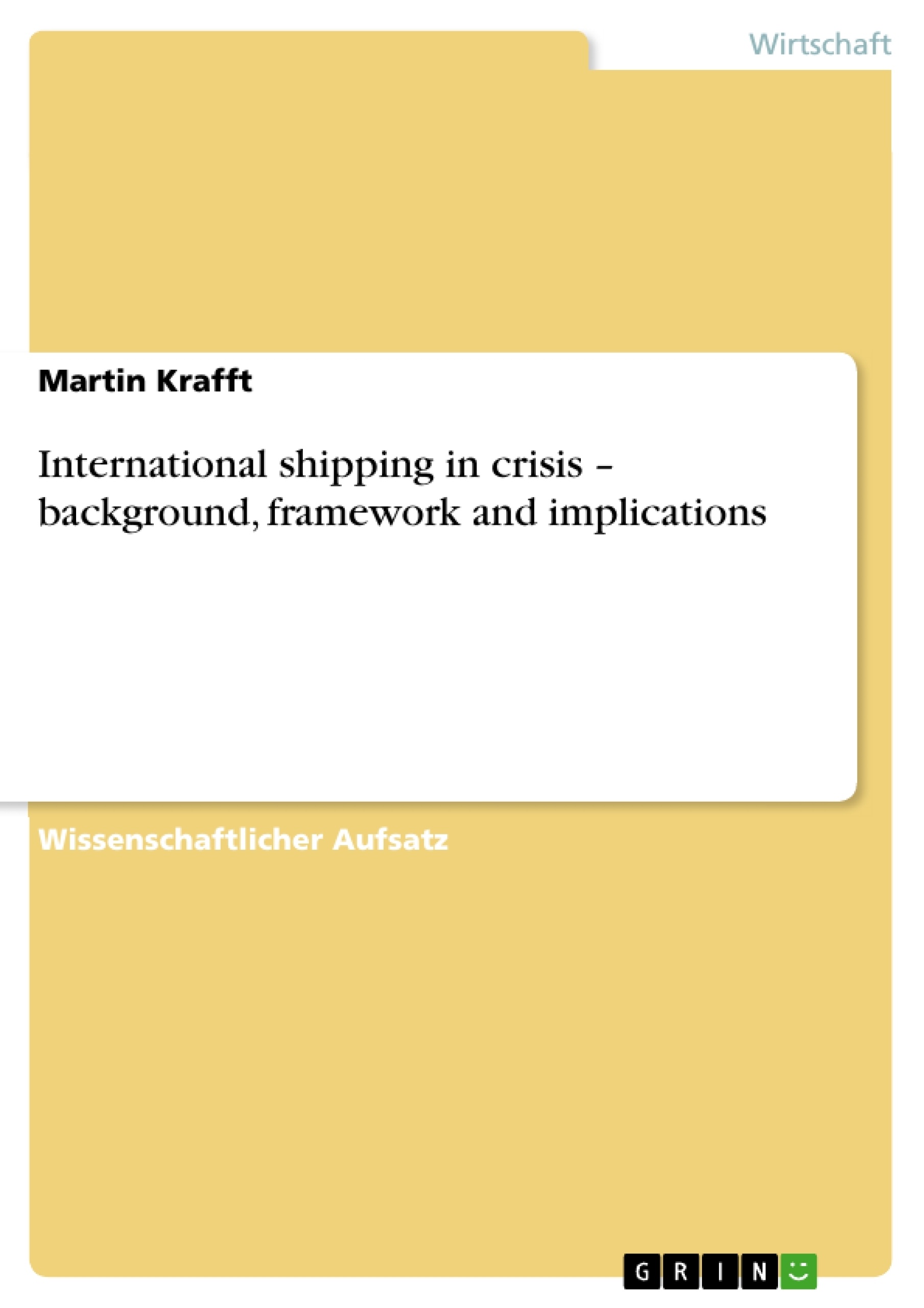International shipping has entered a severe recession. Losses are incurred worldwide and the future is yet uncertain.
Since the long and deep shipping crises in the 1980s, international sea borne trade was enjoying continuous growths. Especially since the turn of the millennium, all shipping related markets remained firmly bullish and people were in the belief of endless growth in economy and trade, fuelled by Asia’s and especially China’s seemingly infinite appetite for progress and development. However, these fundamentals have changed dramatically over the recent 18 months.
International shipping in crisis – background, framework and implications
International shipping has entered a severe recession. Losses are incurred worldwide and the future is yet uncertain.
Since the long and deep shipping crises in the 1980s, international sea borne trade was enjoying continuous growths. Especially since the turn of the millennium, all shipping related markets remained firmly bullish and people were in the belief of endless growth in economy and trade, fuelled by Asia’s and especially China’s seemingly infinite appetite for progress and development. However, these fundamentals have changed dramatically over the recent 18 months.
Maritime operators in today’s shipping environment have a multitude of inter-relations within the business cluster. They often combine the functions of ship owners, ship managers and liner operators. Ship owners are the ultimate enablers of global sea borne trade. Without their risk capital, the international exchange of goods would be severely restricted. Shipmanagement is an industry that has only started to develop in the 1970's. Shipmanagement is in-line with the global trend for outsourcing of non-core activities. The latter is based on the general belief that asset management is often times more efficiently performed separate from asset ownership. Liner operators finally are the ones who ship a good on a seagoing vessel. They either do this based on a regular service or as tramp operators following the specific import and export requirements on a case-to-case basis.
One of the most frequently reported headlines in the global press throughout 2008 and 2009 is that of the „financial crisis“. And one lesson to be learned from the past few decades, is that international trade is inextricably linked to global economic growth and vice versa. When trade goes down, the world economy is in trouble, and shipping companies face a core problem of overcapacity. During the recent 1½ years shipping has entered a very severe recession. A downturn as dramatic as this one has never been experienced in such a short period of time.
Globalization is a phenomenon everybody in shipping can relate to, as we have witnessed the impact of globalization first hand, in recent times mostly in a positive way. Due to its nature of being the only industry providing economical long-haul transportation, shipping was able to benefit from increasing global work sharing like few other sectors. Those positive aspects of globalization, lead to higher welfare generated in emerging countries as they turned export nations and an easing effect on inflation in industrialized nations, as they took advantage of less expensive working conditions in remote countries.
However, as it turned out in the recent 1½ years, this tightly knit economic world also holds much room for negative developments for those involved as we can witness through the global financial crisis, which has hit shipping, and thus all of us, with vengeance. We had in late 2008 and earlier 2009 come to a point, where to a certain extent world trade had stopped functioning as letters of credit were partly not honoured any more from one bank to another. As a consequence, much less cargo is being shipped worldwide and rates on major routes had fallen from an all time high to an all time low within a very short period of time. A colourful example are cape size bulk carriers, which were earning something like USD 150.000 per day earlier in 2008 and which had dropped to rates less than USD 4.000 per day.
The crisis is a development that actually had its roots far away from the shipping markets, however, due to its powerful impact on our daily business and personal life it is worthwhile to take a deeper look at the factors driving it.
When in mid 2007, first reports pointed towards developing problems in the US real estate and banking sector, only few people would have expected that in the following months we would see a new world order of the entire financial world unfold in front of our eyes. The initial scattered reports were followed by a sequence of increasing write-offs on book values for many banks, a subsequent, significant reduction in availability of debt financing, and later on a multitude of takeovers and bankruptcies of well established financial institutions.
[...]
Frequently Asked Questions
What caused the severe recession in international shipping?
The recession was primarily triggered by the global financial crisis starting in mid-2007, leading to a dramatic drop in world trade, overcapacity, and a collapse in freight rates.
How did freight rates change during the crisis?
Rates fell from all-time highs to all-time lows in a very short period. For example, Cape Size bulk carriers dropped from earning USD 150,000 per day to less than USD 4,000 per day.
What is the difference between ship owners, managers, and liner operators?
Ship owners provide the risk capital, ship managers handle the technical and operational outsourcing, and liner operators manage the actual shipping of goods on regular services or as tramp operators.
How does globalization affect international shipping?
Shipping is the backbone of globalization, providing economical long-haul transportation. While it benefited from global work sharing, it also made the industry vulnerable to global economic downturns.
What role did banks play in the shipping crisis?
The crisis reached a point where world trade functionality was threatened because letters of credit were partly not honored by banks, leading to a significant reduction in cargo shipments.
- Quote paper
- Martin Krafft (Author), International shipping in crisis – background, framework and implications, Munich, GRIN Verlag, https://www.grin.com/document/138172



